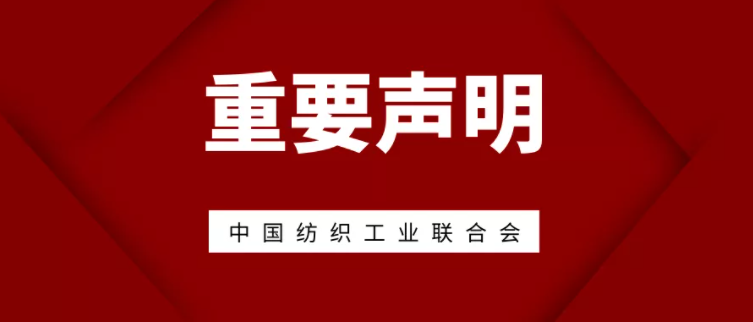
Recently, some international brands and international organizations have excluded Xinjiang cotton and its products from their commercial activities based on lies and false information, which has aroused great indignation among Chinese society, the textile industry and consumers. In this regard, the China National Textile and Apparel Council stated as follows:
1. The China National Textile and Apparel Council agrees with the relevant positions of the Chinese Ministry of Foreign Affairs and the Ministry of Commerce, and opposes any act of stigmatizing Xinjiang cotton. We firmly oppose certain international brands and institutions excluding Xinjiang cotton and its products from their supply chains and daily business based on lies and false information. In March and August 2020, the China National Textile and Apparel Council issued a solemn statement on the US "Xinjiang-related" bill and the US "Xinjiang Supply Chain Business Advisory Announcement" respectively.
2. Xinjiang cotton is a high-quality natural fiber raw material recognized by the global industry, which better meets the rigid consumer demand for cotton textiles and clothing worldwide, and is an important raw material guarantee for the healthy and sustainable development of China's textile industry. In recent years, not only the cotton planting and production in Xinjiang has remained stable, but the cotton textile and clothing industry has also developed rapidly, which has played an important role in promoting regional economic development, solving the employment of people of all ethnic groups, and improving people's well-being. In 2020, Xinjiang's cotton output will be 5.2 million tons, accounting for about 87% of domestic output. As of the end of 2019, there were 808 cotton processing enterprises in Xinjiang, accounting for 84% of the country's total, and the number of cotton spinning spindles reached 19.91 million, accounting for about 16% of the total number of spindles in the country.
3. The China National Textile and Apparel Council hereby emphasizes that the so-called "forced labor" in China's Xinjiang region is completely false and a complete lie and political operation. In January this year, Xinjiang Textile Industry Association released a detailed and objective "Social Responsibility Report of Xinjiang Cotton Textile Industry". We recommend that all stakeholders review the content and views of the Report, respect the values based on facts, and reject false information of political manipulation.
4. The China National Textile and Apparel Council hereby calls on relevant international brands and institutions to face up to the solemn position of Chinese enterprises and consumers, take corrective measures, and stop the wrongful act of excluding Xinjiang cotton and its products from their own supply chains. Such wrongful acts have damaged the legitimate rights and interests of cotton farmers of all ethnic groups and workers in the textile and garment industry in Xinjiang to obtain remuneration and improve their living standards. They are suspected of violating Xinjiang's human rights in the name of "supply chain compliance".
5. China National Textile and Apparel Council welcomes international brands and institutions to visit cotton production areas and textile and garment factories in Xinjiang to independently understand and judge relevant facts. We are willing to provide convenience and assistance for relevant inspections. At the same time, we are willing to provide active support for international brands to carry out trade and investment cooperation with Xinjiang cotton and textile industry.
6. China has the world's largest textile and garment industry with the most complete industrial chain and an independent industry, with obvious international competitive advantages. At the same time, China has built the world's largest textile and garment intermediate product market and retail market. In the past decades of development, China's textile industry has formed a mutually beneficial and win-win supply chain partnership with a large number of international brands and buyers. At the same time, the vast Chinese consumer market is also fully open to international brands. The China National Textile and Apparel Council agrees with the position of the Ministry of Commerce of China: We always welcome and support the normal business activities of multinational companies in China and their efforts to build industrial and supply chains. We hereby call on international brands to respect the legitimate rights and interests of China's textile industry, respect the free choice of China's more than one billion consumers, avoid politicizing commercial issues, and avoid falling victim to individual anti-China forces.
7. The China National Textile and Apparel Council would like to thank the cotton growers and textile industry workers of all ethnic groups in Xinjiang for their long-term fundamental contributions to China's textile industry, thank the Chinese textile and garment enterprises for their large amount of advanced investment in Xinjiang, and thank many domestic brands and some international brands here The firm stance in support of Xinjiang Cotton in this incident. As a representative of the collective interests of China's textile and garment industry, China National Textile and Apparel Council will continue to firmly support the planting and production of cotton in Xinjiang, and will continue to firmly support the prosperity and development of Xinjiang's textile and garment industry!
